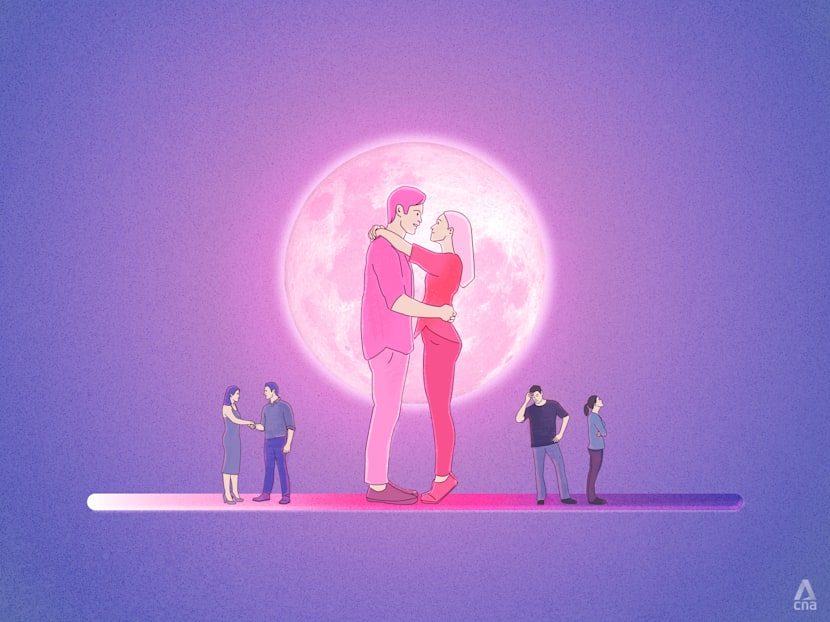Here's how couples can keep romance alive amid humdrum day-to-day life
Many couples cherish the thrill of the honeymoon phase, even though it's natural that this intensity often fades. That doesn't mean the spark has died.

Counsellors told CNA TODAY that it is normal for the honeymoon phase to fade as partners grow familiar. (Illustration: CNA/Samuel Woo)

This audio is generated by an AI tool.
Adulthood is not just one phase of life but comes in stages. Its many facets can be overwhelming, from managing finances and buying a home to achieving work-life balance and maintaining healthy relationships. In this series, CNA TODAY's journalists help readers deal with the many challenges of being an adult and learn something themselves in the process.
When I caught up with a friend for lunch earlier this year, she sighed and confessed: "I wish the honeymoon phase could last forever."
Her fingers toyed with her sparkling wedding ring like a young lovestruck girl. Even though she had dated her now-husband for nearly a decade, their recent marriage seemed to have rekindled that early magic, as if they were newly in love all over again.
I couldn't help but agree silently.
Eight years ago, I experienced my own whirlwind romance after swiping right on a boy with a charming smile and a great sense of humour. Younger (and much prettier), at the age of 20, I felt like the once-bleak world had suddenly been tinted in bubblegum pink.
For the first year, we were practically living in a romantic comedy of our own. If we were not texting, we were video calling. Our dates felt like the grandest of adventures, even in mundane places such as Pasir Ris Park. In my eyes, he could do no wrong.
But then the rose-tinted glasses started to slip as I got to know him on a deeper level. It's not about fights or disagreements – although, like any couple, we have those too. Familiarity started to set in.
Today, our love isn't the same. It's less electric, less giddy. We're still happy together, but we're grounded and focusing on bigger goals: building our careers, waiting for the keys to our Build-to-Order flat, and comfortably following the rhythm of life together.
For the record, I love my fiancé very much. However, I can't help but miss the exhilarating days of our first year together, where I basked in the music of his sweet nothings rather than the cacophonous noise of his well-meaning nagging now.
But when I see social media posts about couples, it's a mix of people saying that the honeymoon phase will never end if it's the right person, and others saying the honeymoon phase is simply a phase.
Can we ever go back to our honeymoon days?

ENCHANTED TO MEET YOU
For most couples entering a relationship for the first time, the initial period of getting to know each other may spark intense attraction, excitement and connection for each other.
This is known as the honeymoon phase.
Research suggests that this period usually lasts between six months and two years, said Ms Theresa Pong, the founder and counselling director of The Relationship Room – depending on life stressors, attachment styles and how emotionally safe partners feel with each other.
Why do we feel so differently during this period?
"From a biological standpoint, this phase is driven by heightened levels of dopamine, oxytocin and norepinephrine – the same neurochemicals responsible for feelings of pleasure, attachment and heightened attention," said Ms Pong.
Such excitement and intensity help couples to get to know each other, discover shared interests and create meaningful memories. This enables them to create a strong emotional connection that prepares them to weather tough times later on.
"It's a period where both partners feel valued and close, laying the foundation for a lasting and secure relationship," she said.
But that's not to say that relationships of couples who do not experience the typical emotional highs of the honeymoon phase will not last.
"Some couples begin their relationship during stressful times or due to other practical reasons," explained Ms Pong. "Thus, the initial excitement may be low or delayed."
"What really matters is how well partners respond to each other’s needs, support each other and stay emotionally connected," she added.
What really matters is how well partners respond to each other’s needs, support each other and stay emotionally connected.
WHEN THE HONEYMOON'S OVER
But just like any phase, the honeymoon period is also one that passes. Our brains eventually adjust to what is familiar.
"The same person who once felt new becomes home, and that's a good thing," said Mr Clifton Tokoara, a counsellor at Eagles Mediation and Counselling Centre. "But it's more of a transition than an ending."
This shift is only normal, he added.
"Our brains aren't wired to stay on that high forever, as we'd never get anything done. Instead, the fire cools into a steadier warmth called attachment."
It's not only normal but healthy for couples to move from infatuation to teamwork, he said – to the "kind of love that pays bills, cares for kids and still laughs at inside jokes 10 years later".
But don't be too quick to mourn the honeymoon phase. In fact, there are dangers to staying in such heightened states of bliss for too long, Mr Tokoara warned.
"If you try to live permanently in that bubble, you risk avoiding conflict or idealising your partner so much that you miss real red flags," he said.
"Love can start to look more like dependence than connection."
MATURING BEYOND THE HONEYMOON
Mr Tokoara has seen many couples try to chase the same high of the honeymoon phase again "when the glow fades".
"They find themselves confused by the gap between how it used to feel and how it feels now, saying things like, 'You used to be so gentle', or 'You used to take care of me'.
"What’s really happening is that the body’s early burst of bonding hormones is wearing off, and reality is setting in," he said.
Ms Pong agreed: "As couples grow and the honeymoon phase naturally fades, it's usually unrealistic to expect the same intense excitement to return."
She added that it is normal for a relationship to mature as couples grow older and gain more life experience.
"As people grow, their needs and ways of showing love also evolve. While early love often feels exciting and intense, with time, it deepens into comfort, security and trust," she said.
"It is true that age can shape this too – younger couples may focus on passion and excitement, while older couples value closeness and companionship.”
However, the end of the honeymoon phase does not mean the love has faded, she emphasised. Rather, it can signal that the love is maturing into warmth, comfort and emotional safety.
From an attachment perspective, as security grows, love shifts from intensity to trust and companionship – the foundation of lasting connection.
"From an attachment perspective, as security grows, love shifts from intensity to trust and companionship – the foundation of lasting connection," she said.
Both experts said there are healthier ways to keep the love alive without needing to return to the honeymoon phase.
It can be as simple as planning a new date together, trying a shared hobby, or even checking in about each other's feelings.
"Research has also shown that feeling understood, supported and emotionally safe with your partner is far more important for long-term relationship happiness than chasing constant passion or novelty," said Ms Pong.
Doing new things together can also wake up the same dopamine circuits that powered the early romance, added Mr Clifton.
"Pair that with kindness, laughter and curiosity, and you'll keep finding new versions of each other."













